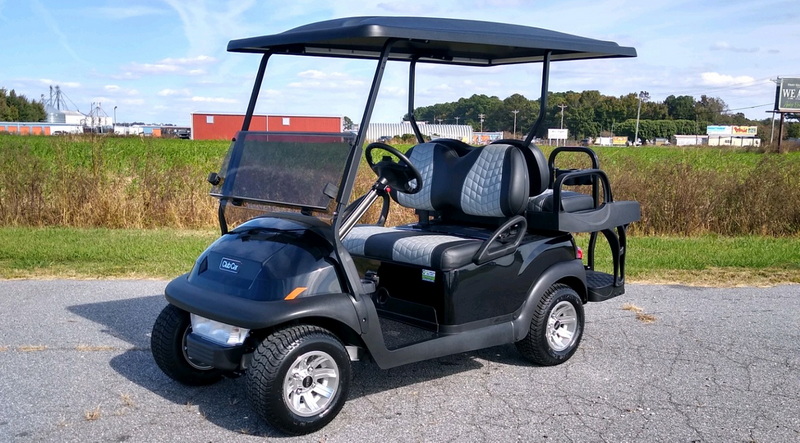Content Menu
● Understanding Electric Golf Cart Weight
● Factors Influencing Weight
>> Model and Design
>> Battery Type
>> Additional Features
>> Accessories
● Weight Distribution and Performance
>> Performance on the Golf Course
>> Terrain Considerations
● Transportation Considerations
>> Loading and Unloading
>> Legal Considerations
● Maintenance and Care
>> Battery Maintenance
>> Tire Maintenance
● Environmental Impact
>> Energy Consumption
>> Sustainable Practices
● Conclusion
● Frequently Asked Questions
>> 1. What is the average weight of an electric golf cart?
>> 2. How does the weight of an electric golf cart affect its performance?
>> 3. Can I transport an electric golf cart in my truck?
>> 4. What type of battery is best for an electric golf cart?
>> 5. How can I maintain my electric golf cart's battery?
Electric golf carts have become increasingly popular in recent years, not only on golf courses but also in various recreational and residential settings. As more people consider purchasing or using electric golf carts, one of the most common questions arises: How heavy is an electric golf cart? Understanding the weight of these vehicles is crucial for several reasons, including performance, transportation, and maintenance. In this article, we will explore the weight of electric golf carts, the factors that influence their weight, and the implications of their weight on usage.

Understanding Electric Golf Cart Weight
Electric golf carts typically weigh between 800 to 1,100 pounds (approximately 363 to 499 kg). However, this weight can vary significantly based on several factors, including the model, battery type, and additional features. For instance, a standard two-passenger electric golf cart may weigh around 900 pounds, while a larger four-passenger model can weigh over 1,400 pounds when fully equipped with batteries.
Factors Influencing Weight
Model and Design
Different manufacturers produce various models of electric golf carts, each with unique designs and specifications. Some models are designed for lightweight performance, while others prioritize durability and additional features, which can increase weight. For example, a compact model designed for quick maneuverability on the golf course may weigh less than a more robust model designed for off-road use.
Battery Type
The type of battery used in an electric golf cart significantly impacts its overall weight. Most electric golf carts use lead-acid batteries, which are heavier than lithium-ion batteries. While lead-acid batteries are more affordable, they add considerable weight to the cart. Conversely, lithium-ion batteries are lighter and can enhance the cart's performance but come at a higher cost. The choice of battery can also affect the cart's range and charging time, making it an important consideration for potential buyers.
Additional Features
Many electric golf carts come with optional features such as larger wheels, upgraded seating, and additional storage compartments. These features can add extra weight to the cart. For example, a golf cart equipped with a rear seat for additional passengers will weigh more than a standard two-passenger model. Additionally, features like built-in coolers, sound systems, and enhanced lighting can further increase the weight.
Accessories
Accessories such as golf bag holders, canopies, and custom paint jobs can also contribute to the overall weight of the cart. While these accessories enhance the cart's functionality and aesthetics, they can also increase the total weight. Buyers should consider how these accessories will impact the cart's performance and usability.

Weight Distribution and Performance
The weight distribution of an electric golf cart plays a crucial role in its performance. A well-balanced cart will handle better on various terrains, providing a smoother ride for passengers. Heavier carts may struggle on steep inclines or uneven surfaces, while lighter carts may offer better maneuverability but could be less stable.
Performance on the Golf Course
On the golf course, the weight of an electric golf cart can affect its speed and efficiency. Heavier carts may require more power to navigate hills and rough terrain, which can lead to faster battery depletion. Conversely, lighter carts may have better acceleration and can travel longer distances on a single charge. Golfers should consider the weight of the cart when choosing a model that best suits their playing style and course conditions.
Terrain Considerations
The type of terrain where the golf cart will be used is another important factor. For instance, if the cart is primarily used on flat, well-maintained golf courses, a heavier model may not pose significant issues. However, if the cart is intended for use in hilly or rugged areas, a lighter model with better weight distribution may be more suitable.
Transportation Considerations
When transporting an electric golf cart, weight is a critical factor. Most standard trailers and truck beds can accommodate the weight of a golf cart, but it is essential to ensure that the vehicle used for transportation can handle the load. Additionally, the weight of the cart can impact fuel efficiency during transport, especially if towing a heavier cart over long distances.
Loading and Unloading
Loading and unloading an electric golf cart can also be influenced by its weight. Heavier carts may require ramps or additional assistance to load onto a trailer or into a truck bed. It is essential to use proper techniques and equipment to avoid injury or damage to the cart during the loading process. Using a loading ramp designed for the weight of the cart can make this process safer and more efficient.
Legal Considerations
In some regions, there may be legal restrictions regarding the transportation of electric golf carts, especially if they are being towed on public roads. It is important to check local regulations to ensure compliance and avoid potential fines. Additionally, understanding the weight limits of your vehicle and trailer is crucial for safe transportation.

Maintenance and Care
The weight of an electric golf cart can also affect maintenance and care. Heavier carts may experience more wear and tear on tires and suspension systems, leading to more frequent maintenance needs. Regular inspections and maintenance are crucial to ensure the longevity and performance of the cart.
Battery Maintenance
Battery maintenance is particularly important for electric golf carts. The weight of the batteries can impact the overall weight of the cart, and proper care can extend the life of the batteries. Regularly checking battery levels, cleaning terminals, and ensuring proper charging practices can help maintain optimal performance. Additionally, understanding the specific maintenance requirements for the type of battery used can prevent premature failure.
Tire Maintenance
Tires are another critical component that can be affected by the weight of the cart. Heavier carts may require tires with a higher load rating to ensure safety and performance. Regularly checking tire pressure and tread depth can help prevent blowouts and improve fuel efficiency.
Environmental Impact
Electric golf carts are often considered more environmentally friendly than their gas-powered counterparts. However, the weight of the cart can influence its energy efficiency. Heavier carts may consume more energy, leading to shorter ranges on a single charge. Choosing a lighter model or optimizing battery performance can help reduce the environmental impact of electric golf carts.
Energy Consumption
The energy consumption of an electric golf cart is directly related to its weight. Heavier carts require more energy to operate, which can lead to increased charging frequency and higher electricity costs. Understanding the energy consumption of different models can help buyers make informed decisions that align with their environmental goals.
Sustainable Practices
To further reduce the environmental impact, users can adopt sustainable practices such as using solar chargers for their electric golf carts. This not only helps in reducing reliance on grid electricity but also promotes the use of renewable energy sources.
Conclusion
In conclusion, the weight of an electric golf cart is an essential factor to consider for potential buyers and users. With weights typically ranging from 800 to 1,100 pounds, various factors such as model, battery type, and additional features can influence the overall weight. Understanding these factors can help users make informed decisions about which electric golf cart best suits their needs.
As electric golf carts continue to gain popularity, it is crucial to consider their weight in relation to performance, transportation, maintenance, and environmental impact. By understanding the implications of weight, users can enjoy a more efficient and enjoyable experience with their electric golf carts.

Frequently Asked Questions
1. What is the average weight of an electric golf cart?
The average weight of an electric golf cart typically ranges from 800 to 1,100 pounds, depending on the model and features.
2. How does the weight of an electric golf cart affect its performance?
Heavier carts may struggle on steep inclines and consume more battery power, while lighter carts can offer better acceleration and longer ranges.
3. Can I transport an electric golf cart in my truck?
Yes, most standard trucks can accommodate the weight of an electric golf cart, but ensure that the truck's weight limit is not exceeded.
4. What type of battery is best for an electric golf cart?
Lithium-ion batteries are lighter and more efficient, while lead-acid batteries are heavier but more affordable. The choice depends on budget and performance needs.
5. How can I maintain my electric golf cart's battery?
Regularly check battery levels, clean terminals, and follow proper charging practices to extend the life of your electric golf cart's battery.











































